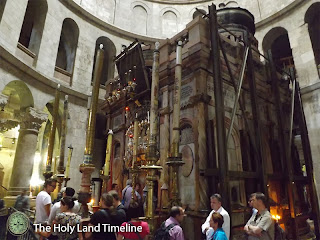A Magnificent and Rare Roman Sarcophagus Uncovered in Caesarea
A unique archaeological discovery was recently made in Caesarea: a Roman-era marble sarcophagus, estimated to be around 1,700 years old, was unearthed in excavations led by the Israel Antiquities Authority (IAA) and initiated by the Caesarea Development Corporation. The sarcophagus features a remarkable mythological scene depicting a drinking contest between Dionysus, the god of wine, and the hero Hercules.

|
| Photo by Yoli Schwartz, Israel Antiquities Authority |
This extraordinary find — the first of its kind in Israel — will be
presented at a public lecture on Thursday, June 12, 2025, during the
"Banquet" conference held at the Eretz Israel Museum in Tel Aviv. The event
is jointly hosted by the IAA, Tel Aviv University, and Bar-Ilan University.
“It was like a scene from a movie,” say archaeologists Noher Shahar and
Shani Amit from the IAA. “As we began to remove the light dune sand, the
edge of a marble artifact peeked through. The entire excavation team
gathered around in excitement. With every scoop of sand, more was
revealed—carved figures of gods, animals, and trees. Each fragment was more
impressive than the last. The climax came in the final hour of the dig, when
an entire side of the sarcophagus was uncovered, showing Hercules reclining
on a lion’s pelt, holding a cup in his hand.”
The broken sarcophagus was transferred to IAA’s conservation specialists.
Conservators Gabriel Solomon, Ilya Almanovski, and Gedamu Wechefo, together
with architect Ido Rosenthal, undertook the meticulous work of cleaning,
restoring, and reassembling the fragments. Thanks to their efforts, the full
mythological scene has come to light: in the center stands Dionysus,
surrounded by a joyful entourage of maenads, satyrs, Hermes, Pan, leopards,
and lions.
“This is the first time we've found the drinking contest between Dionysus
and Hercules depicted on a sarcophagus in our region,” explains Noher
Shahar. “While processions of Dionysus are a common motif on Roman
sarcophagi from the 2nd and 3rd centuries CE, this particular scene has
previously only been seen in mosaics—such as those from Sepphoris and
Antioch. Here, the figures don’t just celebrate—they accompany the deceased
on their final journey, with the wine and dance symbolizing liberation and
transition to the afterlife. The sarcophagus offers a unique perspective on
death—not as an end, but as the beginning of a new path.”

|
||
Photo by Yoli Schwartz, Israel Antiquities Authority
|
And who won the drinking contest? “Judging by the depiction of Hercules
unable to stand, the answer is clear: Dionysus.”
The sarcophagus was found in an area outside the ancient city walls,
indicating that the surrounding archaeological area was more extensive and
richer than previously believed.
Eli Eskosido, Director of the Israel Antiquities Authority, stated:
“This discovery offers a thought-provoking glimpse into Roman beliefs and
life. The sarcophagus is undergoing careful conservation and will eventually
be displayed to the public as part of our commitment to making the country's
heritage accessible to all.”

|
||||
Photo by Yoli Schwartz, Israel Antiquities Authority
|
📅 Upcoming Event:
A lecture on this discovery and its sculpted figures will take place on
Thursday, June 12, 2025, at the Eretz Israel Museum, Tel Aviv, as part of
the IAA’s “Banquet” conference in collaboration with Tel Aviv University and
Bar-Ilan University. The public is invited to attend.












